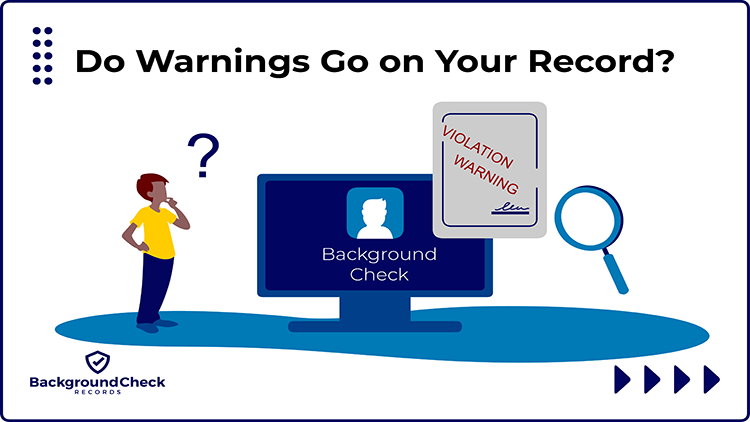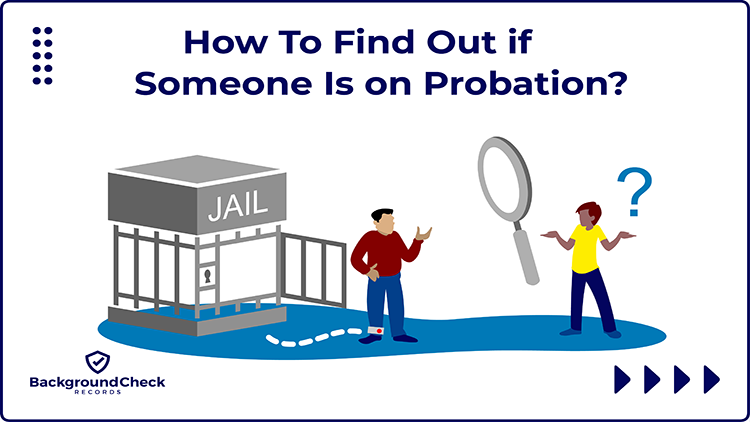Do Warnings Go on Your Record? These Warning Types Do
Every day, over 50,000 drivers in the United States experience a traffic stop, and while being let off without a citation is the best-case scenario, it’s important to understand that traffic warnings are just one type of warning individuals may encounter in their lives. Therefore, understanding the potential impact of warnings can help in planning for the future.
Understanding traffic warnings prevents surprises on driving records and insurance, and this free guide provides what readers need to know about warnings, the various types or traffic warnings, the impact warnings can have on a person and whether or not they show up on public records.
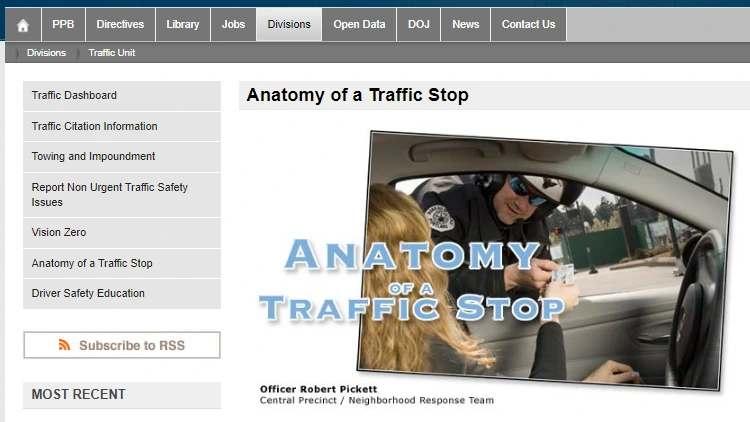
Source: City of Portland, Police Bureau1
Definition & Differences Between Tickets, Citations, Verbal Warnings & Written Warnings in Traffic Stops
When most people think of warnings, they associate them with traffic stops, and there are millions of drivers pulled over in the United States each year, so a firm understanding of the differences between a ticket and citation can be helpful when wondering if warnings go on your record.
For the most part, there is no difference between a ticket and a citation. Both are terms for formal, written documentation for a traffic offense. This can range from improper equipment, such as a broken taillight, to speeding warnings that can rise to a misdemeanor offense depending on the situation and at the officer’s discretion. Felony traffic offenses do not result in a ticket since these are indictable offenses that must go before a grand jury.2
Therefore, a citation or ticket is intended to impose sanctions on a driver in addition to requiring that person to change behaviors or repair issues on a vehicle, and these can sometimes appear on a background check when a driving history is part of the screening.
How Different Warning Types Affect Your Record
There are several different types of warnings a person may encounter in a lifetime. Traffic warnings are among the most common, but other types of warnings include civil orders of protection, trespassing warnings, and on-the-job warnings. Below is more information on each of these types of notices, along with how they can affect a person’s life.
Verbal Traffic Warnings
While traffic tickets and traffic warnings have the same ultimate goal, the desired outcome of a traffic stop is a verbal warning. With a verbal warning, there is no written record when a verbal warning is given; therefore, there is nothing that can be used against a person’s driving record for licensing or insurance purposes.
Verbal warnings are common for things such worn tires or other malfunctioning equipment, and are used by law enforcement as a way to get drivers to correct mechanical issues without having to pay fines or court costs. It is simply a way to help you be safer on the road without being penalized.3
Written Warnings
Written warnings are documentation that the officer stopped a person for a traffic violation and told them to correct the situation, but did not write a formal ticket.
A written warning includes the officer’s name, where the infraction took place and what actions the person should take to correct the matter. For example, if a person has a burned out tail light, the written warning will direct the person to correct the matter.4
Written warnings can be accessed by law enforcement in the jurisdiction where they are issued, meaning a stop by another officer after the written warning can result in a citation or ticket if the issue has not been corrected. In other words, a law enforcement officer issues a written warning for a burned out headlight, but the driver does not correct the issue.
If the driver is stopped by another officer in the same town a few days later, that officer will know a written warning has been issued, ignored, and can write a citation at that point.
The decision to issue warnings lies within the discretion of the department, which establishes its own policies and procedures regarding traffic warnings. For instance, the Portland Police Department in Oregon may issue a written warning ticket for minor traffic offenses if they deem it appropriate. However, in an Oregon background check, warnings usually do not appear.
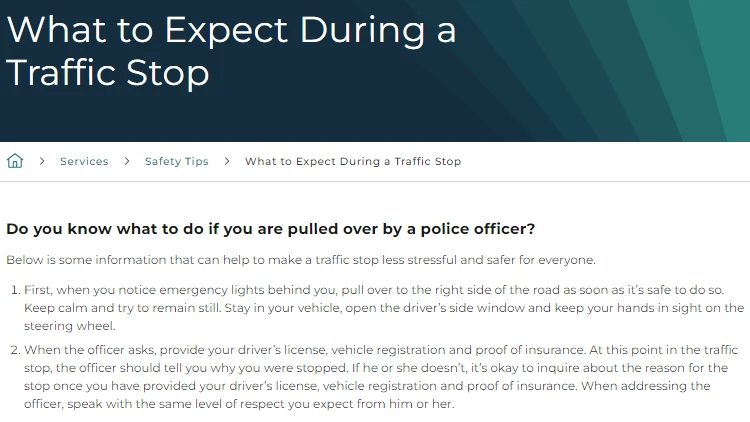
Source: Michigan State Police5
Michigan State Police have a similar policy that allows state officers to give verbal or written warnings on traffic violations when the officer feels it will better serve the purpose of the stop.
Do Warnings Get Recorded? Are Traffic Warnings Included in Your Driving Record?
As discussed, figuring out if warnings go on your record largely depends on the type of traffic warning.
Verbal warnings do not have any paperwork attached to them, so there is essentially no record to access when a person is given a verbal reprimand. Written warnings are not tickets or citations, so this also doesn’t go against a person’s record, but it may appear depending on the state laws or local ordinances.
Written warning can be accessed by law enforcement, but this typically happens when the person is pulled over in the same jurisdiction, or city, where the warning was issued. Warnings can show up on a driving record even if they do not carry points or insurance penalties.6
Some states take a stronger stance than others regarding written warnings and a person’s record. For example, in Massachusetts, even when a person is issued a warning for a traffic stop, each time they are pulled over a record of the stop will come up on the computer when the officer checks the person’s record.
Also, three written warnings in a year in Massachusetts can result in a suspended license even though no ticket was issued per Chapter 90C, Section 3 of the general laws in the state.
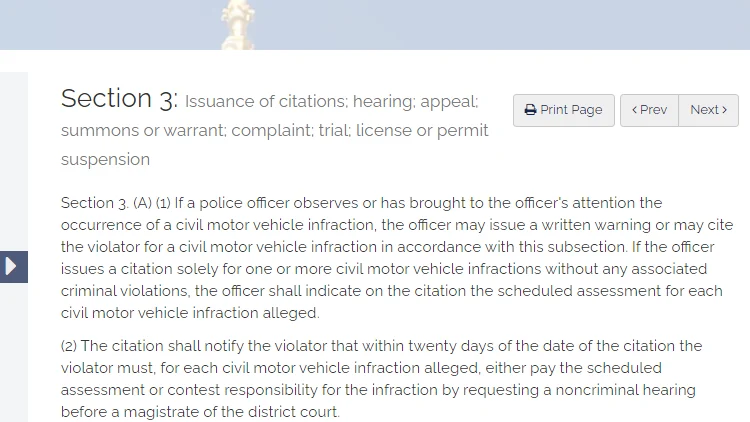
Source: General Court of the Commonwealth of Massachusetts7
Traffic warnings are the most common types of verbal and written warnings issued by law enforcement for violations.
How Long Does a Traffic Warning Stay on Your Record?
The amount of time a warning can stay on someone’s record varies based on the type of warning issued.
Verbal warnings do not appear on a record at all, so a verbal traffic warning will not show up. Written warnings can stay active for a few weeks to months, and may appear on a driving record for up to a year, or until the driver shows proof the issue has been corrected.
Since verbal and written warnings are not official charges or citations, they do not show up on an out-of-state background check or an in-state background check. Once written warnings are removed from the police records, either by the person showing proof of correcting an issue or by passage of time with no further violations, even these warnings will not be relayed to an officer when they stop the driver in the future.
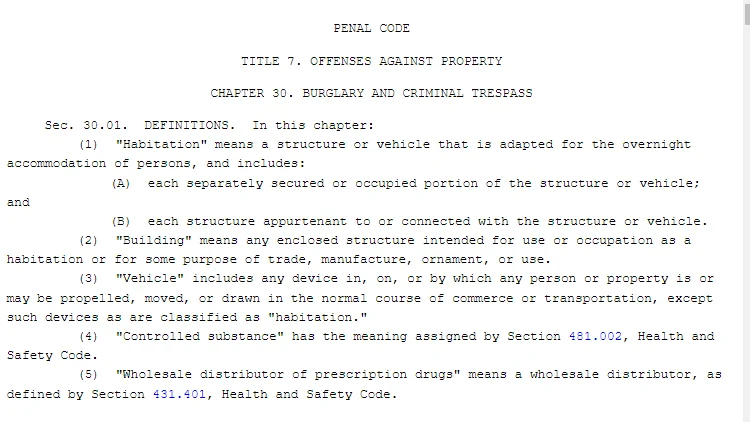
Source: State of Texas, Texas Constitution and Statutes8
A protective order can appear on a person’s record indefinitely; however, it will only show as an active order for the amount of time determined by the court. For example, Texas statute 85.001 limits the amount of time a protective order can be active to two years unless there is a finding by the judge that it needs to be longer.
Criminal warnings have the potential to show up on level 1 background checks, or more extensive screenings, but only if the warnings are ignored and lead to formal charges.
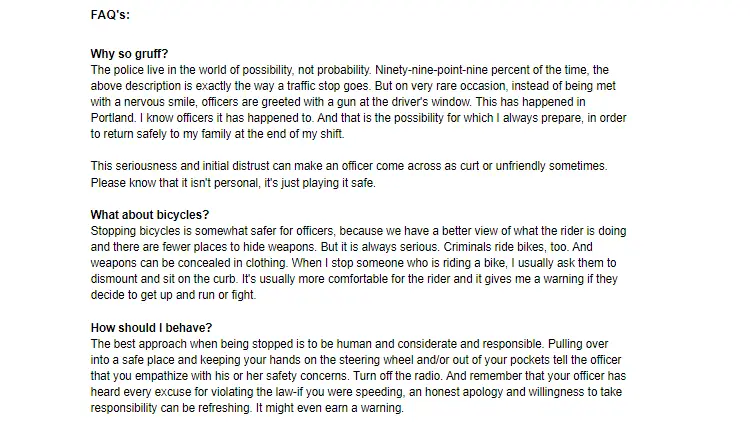
Source: City of Portland, Police Bureau
Best Practices When You Are Being Issued a Traffic Warning
When stopped by police and issued a traffic warning regardless of whether it is a verbal or written warning, the best action to take is to stop doing the action that resulted in the traffic stop, such as speeding, or to correct the mechanical issue that may have led to the warning, such as replacing worn out tires or fixing a burned out light on the vehicle.
Warnings can also be used to compel you to do certain actions such as wearing a seatbelt when in a vehicle or making sure your headlights are on during certain weather conditions.
The bottom line is, when a cop gives you a warning, make sure to correct the issue as quickly as possible to avoid future traffic issues.
Some things a driver can do when pulled over by law enforcement that can increase the chances of a warning being issued instead of a ticket or citation include:
-
- Once you notice law enforcement has turned their lights on to pull you over, move to the right in a quick and safe manner. Pull your car into the first safe location that you come to such as a parking lot or side road that does not have as much traffic. If a parking lot is not available, pull as far to the right as possible for yours and the officer’s safety.
- When pulling over, make sure you use your turn signals and pay attention to the traffic around you to avoid further issues with the officer.
- Completely roll your window down so you and the officer can communicate better.
- Turn off the engine of your vehicle to reduce noise and to put the officer at ease.
- If you are eating or drinking anything, chewing gum or smoking or vaping, put these items away until after the stop is over.
- Make sure you keep your hands on the steering wheel or visible at all times during the stop. If you are pulled over at night, turn on your vehicle’s interior lights so the officer can see you more clearly.
- If the officer tells you to exit your vehicle, or tells a passenger to exit, comply with the officer’s directives. Note, an officer may conduct a pat-down to make sure you are not carrying a weapon; however, you can withhold consent to search your vehicle.
- If you have to reach into your glove compartment for your operator’s license or registration, inform the officer you are doing this prior to reaching for these items. Do not make any quick movements.
- If you have a weapon in the vehicle or you are licensed to carry a concealed weapon, inform the officer immediately for yours and the officer’s protection.
- Remain calm during the traffic stop.
- If you are issued a ticket or citation instead of being let off with just a verbal or written warning, contact an attorney to help with the matter in court. An attorney may be able to get the citation dismissed or reduced to prevent points on your license and insurance.9
A person can run a free criminal background check to see if a traffic warning shows up.
If the warning is on the report, this allows the person to prepare for any questions that may arise when undergoing a background check for employment that involves use of a motor vehicle or requires a driving record.
Warnings can be seen as roadblocks, or they can be seen as opportunities to improve a situation. While a warning can be stressful, knowing that only some types of traffic warnings go on your record can provide alleviation for some.
Frequently Asked Questions
Do Written Warnings Go on Your Record?
Written traffic warnings can go on a driving record, but they typically do not carry license points or insurance rate hikes with them. Other types of warnings also have the potential to go on a person’s record, but usually do not show up on background checks.
How Long Does a Speeding Ticket Stay on Your Record for Insurance?
Most speeding tickets fall off a person’s insurance in 3 to 5 years.
Do Criminal Trespassing Warnings Go on Your Record?
Criminal trespass warnings, which are issued when a person is notified to stay off a certain piece of property, can show up on a person’s record because law enforcement must track these for enforcement. They do not show up, however, on a background check. Only criminal trespass charges and convictions show up on background reports.
1 City of Portland, Police Bureau. (2023). Anatomy of a Traffic Stop. Retrieved June 6, 2023, from <https://www.portlandoregon.gov/police/article/258015>
2 Friedlander, M. (2022, July 5). Difference Between a Citation and a Speeding Ticket. Bankrate.com. Retrieved April 6, 2023, from <https://www.bankrate.com/insurance/car/difference-between-citation-and-ticket/>
3 What Happens When You Get A Warning Ticket? (n.d.). Way. Retrieved April 6, 2023, from <https://www.way.com/blog/what-happens-when-you-get-a-warning-ticket/>
4 Martin, S. (n.d.). What does it mean if you get a warning ticket? Jerry. Retrieved April 6, 2023, from <https://getjerry.com/questions/what-does-it-mean-if-you-get-a-warning-ticket>
5 Michigan State Police. (2023). What to Expect During a Traffic Stop. Retrieved June 6, 2023, from <https://www.michigan.gov/msp/services/safetytips/safe-driving-tips/what-to-expect-during-a-traffic-stop>
6 Martin, S. (n.d.). Do warnings stay on your driving record? Jerry. Retrieved April 6, 2023, from <https://getjerry.com/questions/do-warnings-stay-on-your-driving-record>
7 General Court of the Commonwealth of Massachusetts. (2023). Massachusetts General Laws Part I. Title XIV. Chapter 90C. Section 3. Retrieved June 6, 2023, from <https://malegislature.gov/Laws/GeneralLaws/PartI/TitleXIV/Chapter90C/Section3>
8 State of Texas, Texas Constitution and Statutes. (2023). Penal Code, Title 1, Chapter 30. Burglary And Criminal Trespass. Retrieved June 6, 2023, from <https://statutes.capitol.texas.gov/Docs/PE/htm/PE.30.htm>
9 Dealing With Police During Traffic Stops: What to Do If You Are Pulled Over. (n.d.). Nolo. Retrieved April 13, 2023, from <https://www.nolo.com/legal-encyclopedia/police-stops-when-pulled-over-30186.html>

